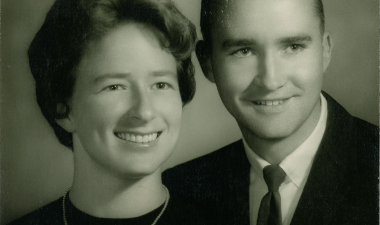She arrived when Stanislaus State shared classroom space with turkeys at the Stanislaus County Fairgrounds in 1960, and while she thought her stay as an English professor for the University would be temporary, Lola Johnson remained for 46 years and left a lasting impact.
Johnson, who died in July at 92, was the last founding faculty member to retire when she departed in 2006, a Presidential Medal of Distinction Hung around her neck.
Her contributions to Stan State cannot be measured by years served, though. She left incalculable memories and lessons with students and colleagues, and she made an indelible mark on the campus atmosphere.
“I volunteered to teach a class with her so I could watch her and see what the magic was,” said Professor Emeritus Jack Williams, who was an English Department colleague of Johnson’s from 1969-2003. “Most of the time I sat and watched and occasionally I would teach a lesson. Like all magic, I don’t know how it happened. It was there, but I don’t know what it was.”
Johnson, who began teaching after earning bachelor’s and master’s degrees from then-College of the Pacific, never sought promotion to assistant professor because she lacked a Ph.D.
Finally in the mid-1970s, the vice president encouraged her to apply to be a tenured assistant professor. Williams served on the review committee.
“One of the things we did was look at her student evaluations and her work as a faculty member,” Williams said. “Her student ratings were so consistently excellent, you realized you’d never be anything like that. It was a standard she established.
“She had this mystique, this reputation, because she was so wonderful in the classroom.”
Her students agree.
Johnson became a nurse after studying at College of the Pacific and hoped to work in OB-GYN to help deliver babies and care for newborns and their mothers.
When the U.S. entered war in Korea, though, Johnson joined the U.S. Army as a nurse and was sent to a Mobile Army Surgical Hospital on the front lines.
Johnson’s fiancé was killed in Korea, and she developed a serious illness there and was airlifted to a U.S. Army hospital in Japan for treatment. Once thought to be rheumatoid arthritis, Johnson’s ailment was diagnosed in 1978 as Korean Hemorrhagic Fever. It made walking difficult the rest of her life, and she knew she couldn’t return to the physical work of nursing.
While hospitalized, a nurse shared books with Johnson, mostly classics, which inspired her to return to Pacific and pursue degrees in English.
She was one-of-four women among the first 10 full-time Stan State faculty. In that first year, she served as advisor to the University’s student newspaper and yearbook. A journalism professor arrived the second year to advise The Signal, and she continued to advise Legend, the school yearbook.
Later, she would be involved with numerous faculty committees and organizations and in the 1980s served as chair of what was then the Department of English, Languages and Philosophy.
She ran it seamlessly, Williams said.
“Maybe she ran it the way she ran her classes, which was without ego,” said former student Lori Gilbert, now a content specialist in the Stan State Office of Communications and Public Affairs. “Lola’s opinion was never more important than any students. I took her British Authors course, and when I bought the textbook, I thumbed through it and found it was 100 percent poetry. I panicked, because I’d never understood poetry and thought I was doomed.
“Instead, this wonderful teacher appreciated everyone’s perspective, and she never tried to overwhelm us with her knowledge. She let students make their own discoveries as she guided us to a better understanding of the material and ourselves.”
Johnson was as generous with colleagues as with students.
“She was on the committee that hired me in 1988, and she became my mentor and good friend at a time when there were only two tenured women in the English Department,” said Professor Emerita Susan Marshall. “She encouraged me by example to listen to others but then do what I felt was right. She disliked praise and avoided awards and administrative promotion at all costs. First and foremost, she was a passionate and dedicated teacher.”
Johnson was so popular that her classes threatened the room’s fire code.
“She felt that each student had a reason for needing her class, and she was happy to teach as many as wanted to be there,” Marshall said.
Her instruction extended beyond the classroom.
“Lola Johnson was working, teaching and spreading knowledge when I started here; what an inspiration!” said English Professor Scott Davis. “She was a constant reminder of how new this campus was, but also how much could be accomplished in the span of a single professional career.”
Williams, too appreciates that legacy.
“For many years, everyone on campus knew Lola or who Lola was,” Williams said. “She infused a kind of spirit. She was one of the people who helped create an atmosphere on campus of being there for the students. Over the last several years, Stan State’s reputation is as one of the most successful schools in helping students move upward in their careers after they leave. I’m very proud of that.
“Promoting the students is what we were there to do. Lola is the one who helped me develop along those lines. I owe her a lot.”



